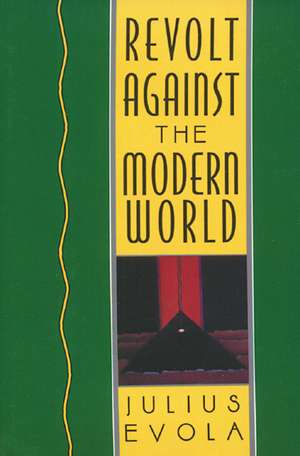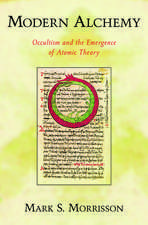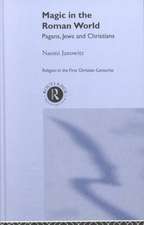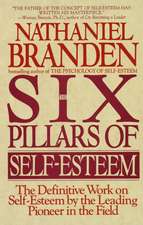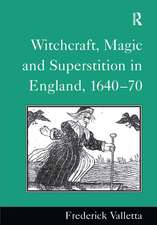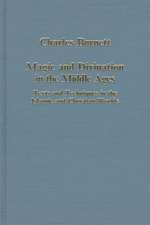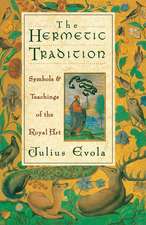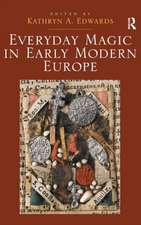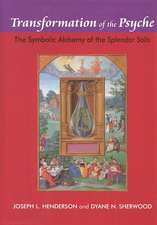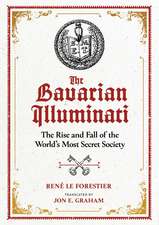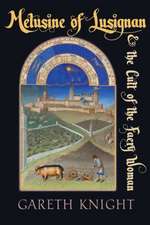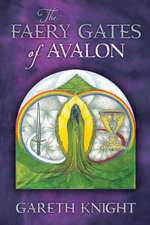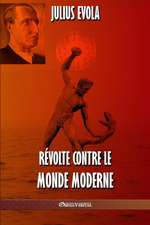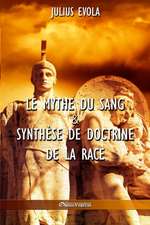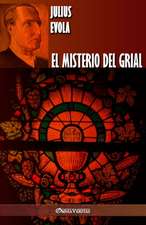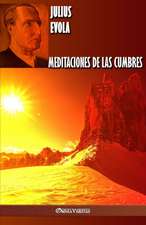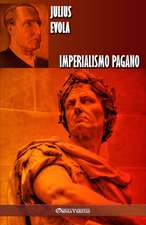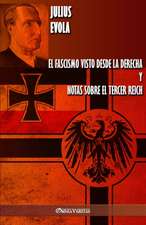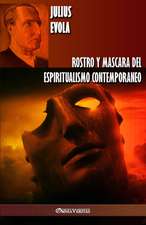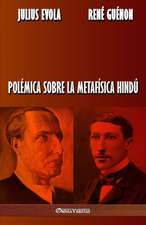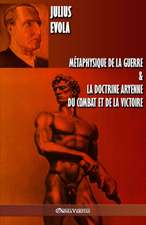Revolt Against the Modern World: Politics, Religion, and Social Order in the Kali Yuga
Autor Julius Evolaen Limba Engleză Hardback – oct 1995
Preț: 137.36 lei
Preț vechi: 191.79 lei
-28% Nou
Puncte Express: 206
Preț estimativ în valută:
26.29€ • 28.54$ • 22.08£
26.29€ • 28.54$ • 22.08£
Carte disponibilă
Livrare economică 04-16 aprilie
Preluare comenzi: 021 569.72.76
Specificații
ISBN-13: 9780892815067
ISBN-10: 089281506X
Pagini: 412
Dimensiuni: 152 x 229 x 30 mm
Greutate: 0.82 kg
Editura: Inner Traditions/Bear & Company
Colecția Inner Traditions
ISBN-10: 089281506X
Pagini: 412
Dimensiuni: 152 x 229 x 30 mm
Greutate: 0.82 kg
Editura: Inner Traditions/Bear & Company
Colecția Inner Traditions
Notă biografică
A controversial scholar, philosopher, and social thinker, Julius Evola (1898-1974) has only recently become known to more than a handful of English-speaking readers. An authority on the world's esoteric traditions, Evola wrote extensively on ancient civilizations and the world of Tradition in both East and West. Other books by Evola published by Inner Traditions include Eros and the Mysteries of Love, The Yoga of Power, The Hermetic Tradition, and The Doctrine of Awakening.
Extras
No idea is as absurd as the idea of progress, which together with its corollary notion of the superiority of modern civilization, has created its own “positive” alibis by falsifying history, by insinuating harmful myths in people’s minds, and by proclaiming itself sovereign at the crossroads of the plebeian ideology from which it originated.
In order to understand both the spirit of Tradition and its antithesis, modern civilization, it is necessary to begin with the fundamental doctrine of the two natures. According to this doctrine there is a physical order of things and a metaphysical one; there is a mortal nature and an immortal one; there is the superior realm of “being” and the inferior realm of “becoming.” Generally speaking, there is a visible and tangible dimension and, prior to and beyond it, an invisible and intangible dimension that is the support, the source, and the true life of the former.
--from chapter one
This present “civilization” . . . has brought to all strata of society and to all races the following “gifts”: restlessness, dissatisfaction, resentment, the need to go further and faster, and the inability to possess one’s life in simplicity, independence, and balance. Modern civilization has pushed man onward; it has generated in him the need for an increasingly greater number of things; it has made him more and more insufficient to himself and powerless.
--from chapter thirty‑five
Even though it may be destined to disappear, modern civilization is certainly not the first to become extinct, nor is it the one after which none will follow. In the life of what is conditioned by space and time, lights are continually being put out and kindled again; cycles end and new ones begin. As I have said, the doctrine of the cycles was known to traditional man, and only the ignorance of modern man has induced him to believe that his civilization, which is characterized by the deepest roots in the temporal and contingent element, will enjoy a different and privileged fate.
--from the conclusion
In order to understand both the spirit of Tradition and its antithesis, modern civilization, it is necessary to begin with the fundamental doctrine of the two natures. According to this doctrine there is a physical order of things and a metaphysical one; there is a mortal nature and an immortal one; there is the superior realm of “being” and the inferior realm of “becoming.” Generally speaking, there is a visible and tangible dimension and, prior to and beyond it, an invisible and intangible dimension that is the support, the source, and the true life of the former.
--from chapter one
This present “civilization” . . . has brought to all strata of society and to all races the following “gifts”: restlessness, dissatisfaction, resentment, the need to go further and faster, and the inability to possess one’s life in simplicity, independence, and balance. Modern civilization has pushed man onward; it has generated in him the need for an increasingly greater number of things; it has made him more and more insufficient to himself and powerless.
--from chapter thirty‑five
Even though it may be destined to disappear, modern civilization is certainly not the first to become extinct, nor is it the one after which none will follow. In the life of what is conditioned by space and time, lights are continually being put out and kindled again; cycles end and new ones begin. As I have said, the doctrine of the cycles was known to traditional man, and only the ignorance of modern man has induced him to believe that his civilization, which is characterized by the deepest roots in the temporal and contingent element, will enjoy a different and privileged fate.
--from the conclusion
Cuprins
Revolt Against the Modern World
Politics, Religion, and Social Order in the Kali Yuga
A Short Introduction to Julius Evola
Translator's Preface
Foreword
Part One - The World of Tradition
1. The Beginning
2. Regality
3. Polar Symbolism; the Lord of Peace and Justice
4. The Law, the State, the Empire
5. The Mystery of the Rite
6. On the Primordial Nature of the Patriciate
7. Spiritual Virility
8. The Two Paths in the Afterlife
9. Life and Death of Civilizations
10. Initiation and Consecration
11. On the Hierarchical Relationship Between Royalty and Priesthood
12. Universality and Centralism
13. The Soul of Chivalry
14. The Doctrine of the Castes
15. Professional Associations and the Arts; Slavery
16. Bipartition of the Traditional Spirit; Asceticism
17. The Greater and the Lesser Holy War
18. Games and Victory
19. Space, Time, the Earth
20. Man and Woman
21. The Decline of Superior Races
Part Two - Genesis and Face of the Modern World
Introduction
22. The Doctrine of the Four Ages
23. The Golden Age
24. The Pole and the Hyperborean Region
25. The Northern-Atlantic Cycle
26. North and South
27. The Civilization of the Mother
28. The Cycles of Decadence and the Heroic Cycle
29. Tradition and Antitradition
30. The Heroic-Uranian Western Cycle
31. Syncope of the Western Tradition
32. The Revival of the Empire and the Ghibelline Middle Ages
33. Decline of the Medieval World and the birth of Nations
34. Unrealism and Individualism
35. The Regression of the Castes
36. Nationalism and Collectivism
37. The End of the Cycle
Conclusion
Appendix: On The Dark Age
Index
Politics, Religion, and Social Order in the Kali Yuga
A Short Introduction to Julius Evola
Translator's Preface
Foreword
Part One - The World of Tradition
1. The Beginning
2. Regality
3. Polar Symbolism; the Lord of Peace and Justice
4. The Law, the State, the Empire
5. The Mystery of the Rite
6. On the Primordial Nature of the Patriciate
7. Spiritual Virility
8. The Two Paths in the Afterlife
9. Life and Death of Civilizations
10. Initiation and Consecration
11. On the Hierarchical Relationship Between Royalty and Priesthood
12. Universality and Centralism
13. The Soul of Chivalry
14. The Doctrine of the Castes
15. Professional Associations and the Arts; Slavery
16. Bipartition of the Traditional Spirit; Asceticism
17. The Greater and the Lesser Holy War
18. Games and Victory
19. Space, Time, the Earth
20. Man and Woman
21. The Decline of Superior Races
Part Two - Genesis and Face of the Modern World
Introduction
22. The Doctrine of the Four Ages
23. The Golden Age
24. The Pole and the Hyperborean Region
25. The Northern-Atlantic Cycle
26. North and South
27. The Civilization of the Mother
28. The Cycles of Decadence and the Heroic Cycle
29. Tradition and Antitradition
30. The Heroic-Uranian Western Cycle
31. Syncope of the Western Tradition
32. The Revival of the Empire and the Ghibelline Middle Ages
33. Decline of the Medieval World and the birth of Nations
34. Unrealism and Individualism
35. The Regression of the Castes
36. Nationalism and Collectivism
37. The End of the Cycle
Conclusion
Appendix: On The Dark Age
Index
Recenzii
"Revolt Against the Modern World is destined to remain an essential work and frame-of-reference for anyone seriously involved in native European spirituality."
"Evola does not write in abstract philosophical language but in lively prose, filled with fascinating and concrete details. Given a basic grounding in history and culture, one can dip into the book anywhere and find new twists and reinterpretations. Such an encounter with a totally original mind is a rarity in these days of bland consensus, and a thrilling one whether one agrees with Evola or not."
"Evola does not write in abstract philosophical language but in lively prose, filled with fascinating and concrete details. Given a basic grounding in history and culture, one can dip into the book anywhere and find new twists and reinterpretations. Such an encounter with a totally original mind is a rarity in these days of bland consensus, and a thrilling one whether one agrees with Evola or not."
Descriere
In what many consider to be his masterwork, Evola contrasts the characteristics of the modern world with those of traditional societies, from politics and institutions to views on life and death.
